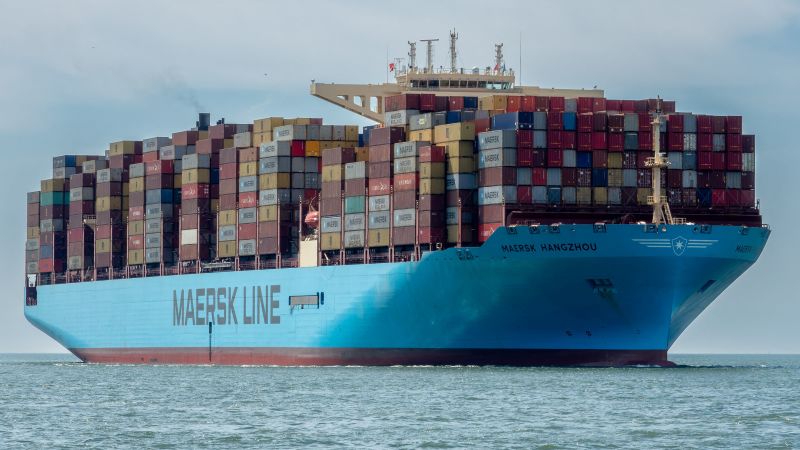Maersk has suspended shipping through the Red Sea and Suez Canal “until further notice” as it continues to review security following an attack on one of its vessels, as one of the world’s most important maritime trade routes has seen growing attacks on transiting ships.
The extended suspension reflects international shipping giants’ concerns with growing attacks from Houthi rebels in the Red Sea, which they say are revenge against Israel for its military campaign in Gaza. This is one of the world’s most important maritime trade routes and prolonged attacks could disrupt the global economy.
The Danish shipping company initially introduced a 48-hour pause in transits through the Red Sea starting Sunday in the wake of the weekend attack by Iranian-backed Houthi militants on the Maersk Hangzhou.
The attack happened just days after Maersk had resumed sailing in the area following the establishment of a US-led international naval mission to protect commercial shipping.
“An investigation into the incident is ongoing and we will continue to pause all cargo movement through the area while we further assess the constantly evolving situation,” Maersk said in a statement Tuesday.
It added that, in some cases, vessels will be rerouted around the Cape of Good Hope in South Africa.
A schedule published on Maersk’s website late Monday showed that more than 100 of its vessels sailing in the coming weeks have been diverted, reflecting how precarious the situation is in one of the world’s vital trade routes. The Suez Canal, which connects the Red Sea to the Mediterranean Sea, typically ferries as much as 30% of global container trade.
Other major shipping firms, including Hapag-Lloyd, Evergreen Line and MSC Mediterranean Shipping Company, have also stopped using the critical waterway due to attacks by Houthis, who say they are taking revenge against Israel for its military campaign against Hamas in Gaza.
The disruption to global supply chains is already pushing up freight costs and lengthening delivery times.
“The longer voyages for diverted services mean longer lead times for importers and some threat of port congestion… though so far there have not been reports of backlogs,” said Judah Levine, head of research at logistics company Freightos.
Maersk initially resumed shipping through the waterway around Christmas only to pause transit again after the Maersk Hangzhou was hit by “an unknown object” as it passed through the Bab al-Mandab Strait at the southern entrance to the Red Sea, en route from Singapore to Port Suez in Egypt.
“After the initial attack, four boats approached Maersk Hangzhou and opened fire in an attempt to board the vessel,” the company said.
The US military said its helicopters responded to distress calls from the vessel and sank three boats operated by the Houthis, killing those aboard. A fourth boat fled the area, it said.
French firm CMA CGM said last week that it would gradually increase the number of vessels transiting through the Suez Canal. The company declined to comment further on Tuesday, referring CNN to its statement of December 26.
Germany’s Hapag Lloyd, meanwhile, said that its ships would continue sailing around the Cape of Good Hope given the “incidents” in recent days. “We monitor the situation closely day by day, but will continue to reroute our vessels until January 9th,” when the position will be reviewed again, a company spokesperson told CNN Tuesday.
Freight rates and shares jump
Shares in Maersk and Hapag-Lloyd rallied on the first trading day of the new year, likely boosted by expectations that the companies will be able to lock in higher shipping rates going into 2024.
Hapag-Lloyd traded 3.6% higher at 11:30 a.m. ET, while Maersk gained 6.4%. Both companies have announced new charges in recent weeks to transport goods along many of the world’s busiest trade routes.
According to Freightos data, the cost to ship a common 40-foot container from Shanghai to New York climbed to an average of almost $5,000 this week, up from $3,500 in the middle of December. To send the same size container from Shanghai to Rotterdam, Europe’s busiest container port in the Netherlands, will cost around $2,400, up from $1,800 in mid December.
“All-in prices” of $5,000-$8,000 per container for major trade routes originating in Asia would be 2.5 to 4 times above “normal levels” for this time of year, according to Levine at Freightos. Although a significant increase, that is still 45%-75% below their “pandemic peak” in late 2021, he added.
Read the full article here




